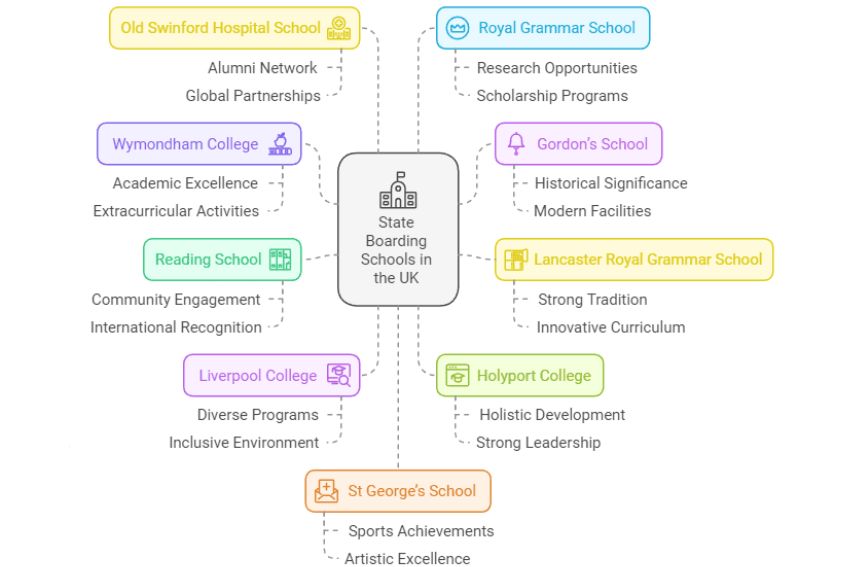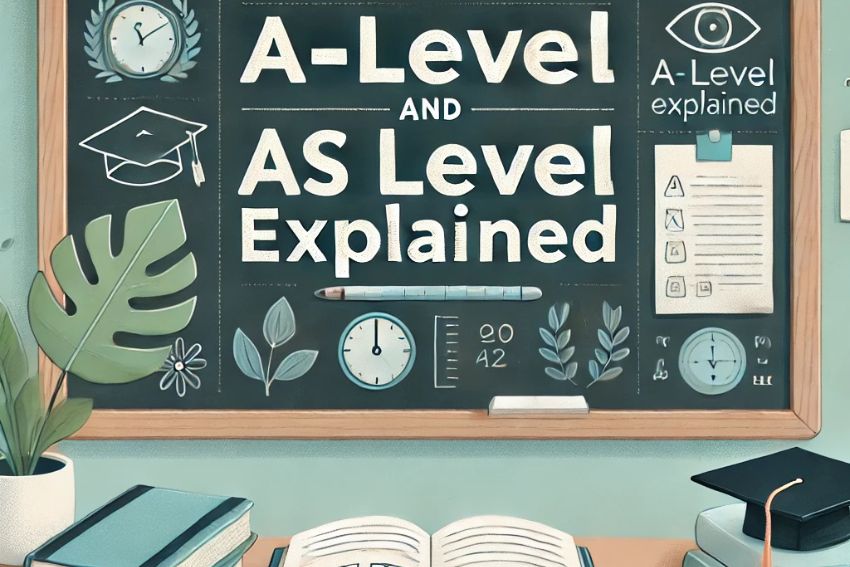The UK has long been recognized for its high-quality education, attracting students from around the world. Known for its rigorous academic standards, curricula, and emphasis on personal growth, the British education system shapes young people into confident, capable individuals. Of course An important part of this system is state boarding schools. State Boarding schools in the UK offer an affordable yet high-quality alternative to traditional private boarding. These schools provide boarding facilities alongside an excellent state-funded education. It gives students access to a unique blend of independence and academic discipline.
With around 40 state boarding schools across the UK, these institutions offer a range of educational approaches and facilities. In this blog, we’ll explore the 10 best state boarding schools in the UK. We give detailed guidance on their fees, ethos, special achievements, and what sets them apart in the educational landscape. So, if you don’t know how to choose state boarding school for your child, we help you! explore our article and learn everything about the state boarding schools in the UK.
The Top State Boarding Schools UK
What Is A State Boarding School?
State boarding schools in the UK are unique institutions providing education and boarding facilities. However, they differ from traditional private boarding schools. The education provided is funded by the government, making it free for all students, while the boarding element is paid for by the families. This setup offers an affordable option for parents who want their children to experience boarding life without the high tuition fees associated with private boarding schools.
State boarding schools are an excellent choice for families looking for a high-quality education paired with the benefits of a structured, independent living environment. State boarding schools follow the national curriculum and are typically inspected by Ofsted. So you can be assured that they meet the same educational standards as other state schools. While the academic and extracurricular offerings are comparable to private schools, state boarding schools also focus heavily on fostering independence. Also, resilience, and a strong sense of community among students.
In total, there are around 40 state boarding schools in the UK. Those schools cater to a range of age groups, from primary to sixth form. They often have strong reputations for academic success and pastoral care. State Boarding Schools are preparing students for university or careers, making them a popular choice among families looking for an affordable, well-rounded boarding experience.
The 10 Best State Boarding Schools in the UK
Before diving into the list, it’s important to understand why these schools stand out as the best state boarding schools in the UK. Each of these schools is celebrated for its unique strengths, such as academic excellence, supportive environments, and a wide range of extracurricular opportunities. They consistently perform well in national rankings. Top 10 best schools provide outstanding pastoral care, and are committed to nurturing well-rounded, responsible, and confident individuals.
All of these schools are rated “Outstanding” by Ofsted. These state boarding schools not only focus on academic achievement but also emphasize personal growth, independence, and a strong sense of community – all at an affordable price for families. Here are the top 10 state boarding schools in the UK, with insights into what makes each one special, their boarding costs, and the values they bring to students.

Wymondham College, Norfolk
Wymondham College is located in Morley, near Wymondham, Norfolk. It is the largest co-educational state boarding and day school in the UK. The school accommodates students aged 11 to 18. It was established in 1951 on the site of a former military hospital. Over the years, it has become a well-respected school known for its academic success and vibrant community.
The college consistently achieves excellent academic results. This places it among the top-performing state schools in the country. The curriculum offers a wide range of subjects, encouraging students to explore their interests and excel in different areas. The school’s ethos focuses on developing students holistically, promoting independence, resilience, and a strong sense of community.
The campus spans 83 acres and has excellent facilities. These include modern classrooms, science laboratories, sports fields, and arts studios. Students can take part in a variety of extracurricular activities, such as sports, performing arts, and clubs. These opportunities ensure a well-rounded educational experience for all students.
So, boarding at Wymondham College offers a supportive and nurturing environment, with accommodations designed to provide a home-away-from-home experience. The boarding community is integral to the school’s vibrant atmosphere, fostering strong bonds and lifelong friendships among students.
Fee for boarding: Approximately £13,000 per year.
Day students: Free (funded by the government).
Wymondham College Full Inspection Report By ofsted
Gordon’s School, Surrey
Gordon’s School,is located in West End, near Woking, Surrey. It is a respected co-educational state boarding and day school for students aged 11 to 18. The school was founded in 1885 as a memorial to General Charles Gordon. It values discipline, academic excellence, and character development.
The school is known for its strong GCSE and A-Level results. Gordon’s School emphasises high standards and personal growth, helping students become well-rounded individuals. These students are well-prepared for leadership roles. The school sits on a beautiful 50-acre campus with modern facilities, such as science labs, sports fields, and an arts centre.
Additionally, Gordon’s offers a variety of extracurricular activities, from sports to the Duke of Edinburgh Award. These activities enrich students’ experiences beyond the classroom. While tuition is free as a state school, boarding fees are about £5,615 per term. Boarding is an important part of life at Gordon’s. It helps students develop independence and resilience.
Gordon’s School provides a unique mix of strong academics, pastoral care, and a vibrant campus life. This prepares students for success in their future careers and life.
Fee for boarding: Around £14,000 per year.
Day students: Free (funded by the government).
Gordon’s School Full Inspection Report By ofsted
Lancaster Royal Grammar School, Lancashire
Lancaster Royal Grammar School (LRGS) in Lancaster, Lancashire, is a historic state grammar school for boys aged 11 to 18, with a co-educational Sixth Form. Founded in the 13th century and formally endowed in 1472, LRGS is one of the UK’s oldest state schools. As a state-funded school, education is free, though boarding fees are approximately £12,000 annually.
LRGS is known for its excellent academic results, especially in GCSEs and A-Levels. It often ranks among the top state schools in the UK. The school focuses on high standards, discipline, and personal growth. This helps prepare students for future success.
The campus is large and well-equipped. It includes modern science labs, a music technology suite, and many sports facilities. The school offers a wide range of extracurricular activities, such as sports teams, music ensembles, and academic clubs.
With its rich history and dedication to excellence, LRGS provides a supportive environment. This helps students become confident and capable, ready for their future.
Fee for boarding: Approximately £12,000–£13,000 per year.
Day students: Free (funded by the government).
Lancaster Royal Grammar School Full Inspection Report By ofsted
Reading School, Berkshire
Reading School, located in Reading, Berkshire, is a prestigious state grammar school for boys aged 11 to 18, founded in 1125, making it one of England’s oldest schools. As a state-funded institution, day education is free, while boarding fees are approximately £14,514 annually.
Renowned for its academic excellence, Reading School consistently ranks among the UK’s top state schools, with students achieving high GCSE and A-Level results. The school’s ethos emphasises discipline, academic ambition, and personal growth, earning it recognition as the top-performing state school in the South East.
The campus offers modern science labs, music technology suites, and sports facilities, supporting a broad range of extracurricular activities from music ensembles to sports teams. This rich blend of academic rigor, tradition, and diverse facilities makes Reading School a leading institution in Berkshire, committed to nurturing capable, well-rounded students.
Fee for boarding: Around £13,000–£14,000 per year.
Day students: Free (funded by the government).
Reading School Full inspection report By ofsted
Liverpool College, Liverpool
Liverpool College, located in the heart of Liverpool, is a well-established state boarding school that offers both day and boarding options for students aged 11 to 18. With a strong history of academic excellence, the college has been serving the educational needs of students since its founding in 1840.
The school is renowned for its outstanding academic achievements, consistently placing high in national league tables. It offers a broad curriculum with subjects ranging from the traditional core areas of English, Mathematics, and Science to the arts and humanities. The college’s ethos emphasizes academic rigor, personal responsibility, and community involvement, aiming to develop well-rounded students ready for the challenges of further education or professional life.
Liverpool College’s campus is home to modern classrooms, specialized science labs, a theatre, and sports facilities. The school fosters a rich extracurricular environment, with opportunities for students to participate in music, drama, sports, and various clubs. This vibrant, inclusive atmosphere ensures that every student has the chance to thrive both inside and outside the classroom.
Fee for boarding: Approximately £12,000–£14,000 per year (fees vary depending on the year group and specific accommodation choices).
Day students: Free (funded by the government).
Liverpool College Full inspection report By ofsted
Holyport College, Windsor and Maidenhead
Holyport College, located in the scenic surroundings of Windsor and Maidenhead, is a relatively new institution that opened in 2013. It accommodates students from Year 7 to Year 13, and its unique state boarding system combines high academic standards with a strong pastoral focus.
The school has quickly gained a reputation for academic excellence, particularly in the fields of STEM and the arts. Holyport College’s curriculum is diverse, offering a wide range of subjects including English, Mathematics, Science, Modern Languages, and more. Students are encouraged to challenge themselves and are supported by dedicated staff to reach their full potential.
Holyport College’s ethos centers on respect, responsibility, and academic achievement, providing a nurturing and inclusive environment. The school offers a strong sense of community, and its campus includes modern classrooms, sports facilities, and dedicated spaces for creative arts. The school also places great emphasis on personal growth and character development.
Fee for boarding: Around £10,000–£12,000 per year.
Day students: Free (funded by the government).
Holyport College Full Inspection Report By ofsted
Old Swinford Hospital School, Dudley
Located in Dudley, West Midlands, Old Swinford Hospital School is one of the oldest and most respected state boarding schools in the UK. Founded in 1667, the school has a rich tradition of academic success and provides a balanced educational experience for students aged 11 to 18. Furthermore, its long-standing history adds to its reputation as a prestigious institution.
Old Swinford Hospital School offers a broad and balanced curriculum that prepares students for their GCSEs and A-Levels, with a focus on achieving academic success. In addition, students benefit from a well-rounded education that combines traditional subjects with modern disciplines. The school’s ethos emphasizes discipline, personal growth, and responsibility, while also fostering independent thinkers.
The campus is set in beautiful, spacious grounds with excellent facilities, including science labs, sports fields, and music rooms. Moreover, Old Swinford Hospital School provides a strong range of extracurricular activities, including sports, drama, music, and various clubs, ensuring that students receive a full, well-rounded education. Finally, boarding students enjoy a supportive, family-like environment, which complements their academic life.
Fee for boarding: Approximately £11,000–£13,000 per year.
Day students: Free (funded by the government).
Old Swinford Hospital School Full Inspection Report By ofsted
Royal Grammar School, Buckinghamshire
The Royal Grammar School, located in High Wycombe, Buckinghamshire, is a well-respected independent state grammar school for boys. It has a strong academic track record and offers education from Year 7 to Year 13. The school has a long history of excellence and is considered one of the top state boarding schools in the UK.
Academically, the school achieves exceptional results, with students consistently excelling in GCSE and A-Level exams. The curriculum covers a wide range of subjects, such as languages, humanities, and the sciences, giving students the chance to explore their interests. The school’s ethos focuses on academic excellence, leadership, and character development, helping students succeed in life.
The school has a modern yet traditional campus with state-of-the-art facilities. These facilities support both academic learning and extracurricular activities. Students can participate in various activities, including music, drama, and sports. Boarding at the Royal Grammar School offers students a safe and structured environment, where they can focus on their studies and personal growth.
Fee for boarding: Around £13,000–£15,000 per year.
Day students: Free (funded by the government).
Royal Grammar School Full inspection report By ofsted
St George’s School, Hertfordshire
St George’s School, located in Harpenden, Hertfordshire, is a well-regarded state boarding school that has provided education for boys and girls from Year 7 to Year 13 for many years. The school’s commitment to providing a nurturing, academic, and extracurricular-focused environment has earned it a strong reputation in the local community and beyond.
St George’s offers a wide variety of subjects, from traditional academic subjects like English, Mathematics, and Science, to modern foreign languages, arts, and humanities. The school’s ethos focuses on academic rigor, respect for others, and personal responsibility. Students are encouraged to achieve their personal best in every area of their education, while also learning the importance of community engagement.
The campus at St George’s School is equipped with excellent facilities, including science labs, music rooms, and sports fields, ensuring students have everything they need to excel academically and socially. The school offers a range of extracurricular activities, from music and drama to sports and outdoor adventures. The supportive boarding environment provides a homely atmosphere, allowing students to thrive both academically and personally.
Fee for boarding: Around £11,000–£13,000 per year.
Day students: Free (funded by the government).
St George’s School Full Inspection Report By ofsted
Keswick School, Cumbria
Keswick School, located in Keswick, Cumbria, is a co-educational state boarding and day school for students aged 11 to 18, with a history dating back to the 14th century. As a state-funded academy, education is free, while boarding fees range from £12,344 to £14,946 per year, depending on the student’s year.
Academically, Keswick School consistently excels, achieving high GCSE and A-Level results and holding an ‘Outstanding’ rating from Ofsted. The school’s ethos promotes a passion for learning, resilience, and confidence, fostering well-rounded development.
The campus includes modern science labs, a library, and extensive sports facilities. With a variety of extracurricular activities, from music and drama to sports teams, Keswick School provides a balanced educational experience set against the beautiful backdrop of the Lake District.
Fee for boarding: Around £11,000–£12,000 per year.
Day students: Free (funded by the government).
Keswick School Full Inspection Report By ofsted
Parents should Note that, these figures are approximate and can vary based on the specific boarding arrangements and any additional services provided by the schools. We advise to contact the schools directly or visit their official websites for the most accurate and up-to-date information on boarding fees.
Ranking Factors For State Boarding Schools In The UK

When ranking the best state boarding schools in the UK, several critical factors are considered to ensure a comprehensive assessment of each institution’s strengths and offerings. These factors include academic performance, boarding quality, pastoral care, extracurricular opportunities, and school ethos. Each of these components plays a vital role in defining the overall experience and success of students at these schools.
Lets start and explore each of those important factors:
- Academic Performance: One of the foremost factors is academic achievement, often measured through GCSE and A-Level results, university placements, and the school’s reputation for specific subjects or programs. Schools that consistently produce strong academic outcomes demonstrate their commitment to high educational standards, rigorous teaching, and effective support for students’ learning needs.
- Boarding Quality: Since boarding is a core component, the quality of boarding facilities and residential life is essential. Schools with modern, comfortable boarding facilities, a safe and supportive environment, and a well-structured daily routine often rank higher. Additionally, schools that promote independence, foster a family-like atmosphere, and offer quality accommodation stand out in the rankings.
- Pastoral Care: The welfare of students is paramount in any boarding environment, and top-ranked state boarding schools excel in pastoral care. This includes having dedicated staff members who support students’ emotional well-being, providing mental health resources, and encouraging a strong community culture. Schools that create a nurturing environment help students thrive academically and personally.
- Extracurricular Opportunities: Schools with extensive extracurricular offerings, such as sports, music, arts, leadership programs, and outdoor activities, provide students with a more holistic education. These activities contribute to personal development, resilience, and confidence, making extracurricular opportunities a key factor in assessing schools’ quality and appeal.
- School Ethos and Values upheld by a school contribute to its ranking, as these often define the culture and philosophy that guide student development. Schools that emphasize integrity, community involvement, respect, and ambition tend to cultivate a positive learning environment. where students can flourish both academically and socially.
- Notable Alumni and History: While not always a primary factor, a school’s history and alumni network can add to its prestige and desirability. Schools with notable alumni and a rich historical background often attract families seeking a sense of tradition and a well-established reputation.
What Is The Admission Process For State Boarding Schools In The UK

Here is a step-by-step guide to help you navigate the admission process for state boarding schools in the UK. With tips on preparing for a successful application. State boarding schools have selective criteria, and admission processes may vary, but they generally include applications, assessments, interviews, and boarding considerations.
Understand Eligibility – Can International Students Apply In State Boarding Schools In The UK?
Most state boarding schools in the UK accept applications primarily from UK or EU residents. Non-EU international students are typically not eligible to attend state boarding schools, as these schools are government-funded for tuition, and only the boarding fees are paid by parents. However, there are a few exceptions, and each school may have different guidelines. Check with the individual school if you are an international applicant to confirm eligibility.
Research the State Boarding Schools In the UK Admission Criteria
Each state boarding school in the UK may have slightly different admission criteria and requirements. Here are a few points for parents to investigate for each school:
- Boarding Requirements: Determine if boarding is mandatory or optional for your child’s age.
- Academic Criteria: Many schools require a certain level of academic achievement. So checking past grade requirements or typical entry standards is essential.
- School Ethos and Culture: Every school has a unique ethos, focus areas, and extracurricular strengths. So choose one that aligns with your child’s interests and aspirations.
We advice, to prioritize schools with facilities, programs, and support that match your child’s needs. Consider you child’s needs for both academics and personal development areas.
Prepare for Entrance Exams or Academic Assessments
Most state boarding schools conduct entrance exams or academic assessments to gauge applicants’ knowledge and abilities. Exams usually test core subjects like English, Mathematics, and Science. Here’s what you should prepare for:
- Exam Format: Check if the school uses its own entrance test or follows a standardised format.
- Subjects and Topics: Obtain any practice material or recommended topics from the school to review with your child.
- Application Deadlines: Entrance exams are often scheduled early in the academic year. You need to mark application and exam deadlines to ensure you don’t miss any dates.
Help your child to Practice past papers or sample questions. Familiarize your child with timed exams can improve their performance and confidence.
Prepare Your Child for the Interview Process
In addition to entrance exams, many state boarding schools hold interviews as part of the admission process. The purpose of these interviews is to understand the applicant’s personality, interests, and motivation for joining the school. Here’s how to prepare:
- Interview Style: The interview may include questions about personal interests, past academic achievements, and the reasons for choosing boarding life.
- Practice Common Questions: Examples include, “Why do you want to attend this school?” or “What do you hope to achieve here?”
- Parental Interviews: Some schools may also meet with parents. They aim to discuss family expectations, the child’s strengths, and whether boarding is suitable for the student.
Encourage your child to answer authentically. Teach them think about their goals, strengths, and any contributions they might make to the school community.
Highlight Extracurricular Achievements and Personal Strengths
State boarding schools in the UK value well-rounded students who demonstrate interests beyond academics. In the application, include any extracurricular achievements, leadership experiences, or community involvement your child has participated in.
- Extracurriculars: Schools look for students who will actively participate in sports, arts, or clubs. If your child good in any of them include any notable achievements in these areas.
- Character Traits: Highlight qualities like resilience, independence, and teamwork, which are important for boarding life.
So, Gather any certificates, awards, or recommendation letters from coaches, teachers, or community leaders to support your application.
Complete the Application and Prepare for Boarding Readiness
State boarding school applications generally require detailed personal information, academic records, and possibly a personal statement from the student. Additionally, families should assess boarding readiness, as adapting to boarding life is a major step.
- Application Form: Fill out the form accurately, ensuring all required documents (e.g., proof of residence, previous school reports) are included.
- Boarding Consideration: Discuss boarding life with your child to ensure they understand the structure, independence, and routine required.
If possible, attend an open day or tour the school to help your child feel more comfortable.
Be Mindful of Admission Deadlines and Communication
Each school has specific admission timelines. Being aware of key dates is crucial to ensuring a smooth admission process. Key dates includes application submissions, exam schedules, and interview invitations,
- Admission Deadlines: Mark the final dates for submission, entrance exams, and interviews.
- School Communication: Follow up with the school to confirm they have received all necessary documents and to check for updates.
It will be wise to keep a folder with all necessary documents and copies of the application for easy reference.
Helpful Tips To Get In To State Boarding Schools In The UK

Here are some additional tips for parents and students to consider before applying to state boarding schools. We hope you make the most informed decisions possible:
Evaluate Pastoral and Support Systems
A strong pastoral care system is essential for a positive boarding experience. Inquire about the school’s support network, including house parents, counsellors, and mentoring programmes. Understanding how the school supports students’ well-being and personal development can help reassure families that their child will be looked after emotionally and socially.
Consider the School’s Academic Focus and Strengths
Different state boarding schools in the UK have specific academic strengths, such as a focus on STEM, arts, or languages. Review the school’s curriculum and special programmes to see if they align with your child’s interests and career aspirations. Choosing a school with expertise in an area your child is passionate about can enhance their academic experience and opportunities.
Look into Financial Aid and Bursary Options
While state boarding schools only charge for boarding fees, some may still offer bursaries or financial aid based on family income. If cost is a concern, research whether the school has bursaries or scholarships to help with boarding fees. Contact the admissions office to inquire about application procedures for financial assistance.
Review the School’s Extracurricular Offerings
Extracurricular activities are integral to a well-rounded education, especially in a boarding environment. Check if the school offers sports, arts, music, clubs, and leadership opportunities that suit your child’s interests. Many state boarding schools offer extensive extracurricular programs, and students should consider whether these activities match their hobbies and ambitions.
Prepare for the Transition to Boarding
The transition to boarding life can be challenging for some students, so preparing in advance can make a big difference. Encourage your child to practice independence at home by managing their own schedules, chores, and study routines. Simple tasks like organizing their study time or keeping their room tidy can help ease the adjustment to boarding.
Be Aware of the School’s Behavior Policies
Boarding schools often have strict policies on behaviour, curfews, and conduct due to the communal living environment. Familiarise yourself with the school’s rules on mobile phone use, social interactions, and expectations for personal responsibility. Discussing these rules with your child beforehand will help them understand and adapt to their new environment.
Plan Communication and Visits
Staying connected while your child is away at school is essential for emotional support. Ask the school about their policies on communication, such as phone call schedules, visiting days, and term breaks. Having a clear understanding of how and when you can visit or communicate with your child can help ease the transition for both parents and students.
Consider Long-Term Goals and University Prospects
Many state boarding schools have a high rate of university placements, particularly in prestigious institutions. If your child has a specific career or university goal, look at the school’s history of university acceptances and any support they offer for university applications. Schools that provide career counselling, university preparation, or partnerships with universities can offer a head start.
These tips can help families make well-informed choices, ensuring that the school they select not only meets academic expectations but also supports the student’s emotional and social needs. With the right preparation and open communication, both parents and students can look forward to a fulfilling and successful boarding experience.

What Are Other Options?
If a student doesn’t get into a state boarding school, there are still many great alternative options to explore. Here are some effective paths that can provide a high-quality education, support personal growth, and help students thrive:
Day State Schools
One alternative is to consider local state day schools, which often have strong academic programs, extracurricular activities, and pastoral care. Day schools provide the benefits of a structured school day without the need for boarding, allowing students to continue learning in a familiar, supportive home environment. Many state schools offer specialized programs in arts, sports, and sciences, providing similar enrichment opportunities to those found in state boarding schools.
Private Day and Boarding Schools
Another option is to apply to a private day or boarding school. While private schools have tuition fees, they also offer scholarships and bursaries for students with academic, athletic, or artistic talents, which can make these options more accessible. Many private schools are known for their academic rigor, extracurricular variety, and robust pastoral systems, making them an excellent alternative.
Sixth Form Colleges
For students at the A-Level stage, sixth form colleges provide a focused, two-year learning environment with strong academic and vocational offerings. Some sixth form colleges offer boarding as well, allowing students to enjoy a residential experience. Sixth form colleges are ideal for students who may want to specialize in a particular subject area or need a different setting to achieve their academic goals.
Online Schools and Virtual Learning
Online schools are an increasingly popular alternative for students seeking a flexible, tailored education. Virtual schools offer accredited courses that allow students to learn from home and structure their study schedules around other activities. This approach suits self-motivated students who prefer independence in their learning journey or who need a flexible schedule.
Supplemental Online Tutoring
If your child remains in their current school, online tutoring can be an invaluable resource to boost their academic performance and fill any learning gaps. Platforms like Edumentors connect students with skilled tutors who specialize in various subjects, providing personalized guidance. Online tutors can offer additional support in challenging subjects, help students prepare for exams, and provide academic enrichment beyond the standard curriculum.
Tutors can also help children develop essential study skills and boost confidence in their academic abilities. This support can make a significant difference, especially if students aim to reapply to a state boarding school or other competitive institutions in the future.
Extracurricular and Enrichment Programs
Parent can also consider enrolling children in extracurricular clubs, workshops, or summer camps to develop skills in areas like sports, the arts, leadership, or science. Many organizations, such as youth clubs, sports academies, and local arts centers, offer programs that foster talent and personal development. These activities not only support academic success but also strengthen resilience, teamwork, and communication skills, essential traits for well-rounded individuals.
Conclusion
In conclusion, state boarding schools in the UK offer a unique experience. They combine quality academics with boarding benefits at an accessible cost. These schools provide rigorous academics and a range of extracurriculars. They also foster independence, resilience, and community among students. For families, state boarding schools blend structure and opportunity, allowing students to grow academically and personally in a supportive environment.
However, if admission into a state boarding schools in the UK don’t work out, there are still many excellent paths forward. Options like state day schools, sixth form colleges, and even online schooling provide diverse opportunities tailored to meet students’ needs and ambitions. Moreover, online tutoring can be especially beneficial, whether a student is preparing for exams, catching up on challenging subjects, or seeking enrichment. From our Top Online Tutors your children can access expert, personalized guidance, ensuring they have the support they need to succeed academically, regardless of their school setting.
Ultimately, the UK offers numerous avenues for students to pursue a fulfilling educational journey, and with careful planning, families can find the right fit for their child’s goals, whether through state boarding schools or other enriching educational options.
Explore Similar Blogs
Top 8 Best State Schools in the UK
8 Best State Schools in London
Top 10 Grammar Schools in the UK
Top 10 Private Schools in the UK








